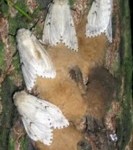 ST. PAUL, Minn. - The Minnesota Department of Agriculture (MDA) and the U.S. Department of Agriculture (USDA) Forest Service are developing plans to eradicate an infestation of gypsy moths in an area near the city of Tower in northeastern Minnesota.
ST. PAUL, Minn. - The Minnesota Department of Agriculture (MDA) and the U.S. Department of Agriculture (USDA) Forest Service are developing plans to eradicate an infestation of gypsy moths in an area near the city of Tower in northeastern Minnesota.
Photo by György Csóka
Gypsy moth is considered one of America 's most destructive tree pests. The insect is not native to North America and has no effective natural controls. Since the early 1900s, it has slowly spread out from New England. It is now common in central Wisconsin, and is threatening to establish itself in Minnesota's northern forests. Once present in sufficient numbers, gypsy moth caterpillars can defoliate large sections of forest.
In 2004, the MDA's annual trapping program found a localized infestation about 8 miles northeast of Tower. Results showed one trap with 28 moths— the largest single trap total recorded in the state. To eradicate the invasive moths before they can spread, officials propose to conduct an aerial application of Bacillus thuringiensis (Btk) on a 640-acre plot of land. The proposed treatment area is mostly on National Forest lands. However, some adjacent private lands are also proposed for treatment. The MDA would oversee the treatments in late May or June.
Btk, the proposed treatment compound, is a U.S. Environmental Protection Agency-approved bacterium known to have very low risk for humans or animals other than caterpillars. Btk occurs naturally in the environment, and is used by organic farmers up to the day of harvest. Since the 1970s, it has been used to control moth infestations on millions of acres across the eastern U.S. In 2002, the MDA used Btk to eradicate a major infestation in Minneapolis. Since 1980, the MDA has eliminated more than 50 gypsy moth infestations on nearly 5,000 acres around the state.
According to MDA Gypsy Moth Program Coordinator Kimberly Thielen Cremers, gypsy moth eradication efforts are important because they help significantly delay the full-scale infestation of Minnesota 's forests.
“We've been working hard to keep gypsy moths from getting a foothold in Minnesota , and this latest finding near Tower reveals a new threat to forests in the Arrowhead region,” Thielen Cremers said. “We have a window of opportunity to eliminate this spot infestation and delay the permanent establishment of the moth in Minnesota . By treating, we help protect forest health, local landowners' property values, and the region's vital tourism industry.”
The USDA Forest Service is preparing an environmental assessment for the proposed treatment and alternatives. To request a copy, call 218-626-4385. To learn more about gypsy moths, visit the MDA website at www.mda.state.mn.us or call the Arrest the Pest Hotline at 1-888-545-MOTH. For details about the proposed treatment, contact Thielen Cremers at 651-296-6692.
CONTACT Minnesota Department of Agriculture Michael Schommer, Communications Director, 651-297-1629



